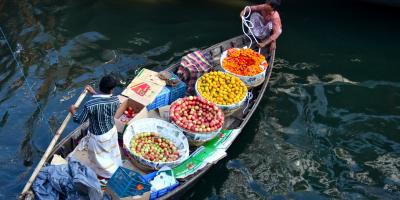
Milan Expo 2015 is all about food, and while many visitors are there to consume it (waiting lines for some of the national pavilions are counted in hours), many are also there to talk about it in legal and policy terms: the debating space at the Angolan pavilion was packed as IDLO, in collaboration with the Milan Centre for Food Law and Policy (MCFLP), launched its latest report, Realizing the Right to Food.
The report delves into what remains a lesser-known, oft-neglected area of human rights; it reviews the way some countries, chiefly in Latin America, have given the right to food constitutional expression; and it examines ways to make the right to food ‘justiciable’ (ie, enforceable through litigation). In Latin America – again – this may involve the procedure of amparo, which allows people to go to court to prevent the government from violating a constitutional right. Other avenues for litigation have notably been explored in India and South Africa.
In the words of former UN Rapporteur Olivier de Schutter, the report brings together the ‘various pathways in which the right to food migrated from the conference rooms of international summits, where it is referred to as part of final declarations as useless in practice as generous in intent, to the courthouses’. The publication is being seen as all the more timely as the issues of food security and nutrition have been given added impetus in the newly adopted 2030 Agenda for Sustainable Development.
Addressing the Milan event, Mr. de Schutter’s successor as UN Rapporteur, Hilver Elal, also commended IDLO’s report for showing, as she put it, that ‘the courts of the world can consider this [the right to food] a real human right’. In his own message, which was read to participants, Italian Agriculture Minister Maurizio Martina spoke of the need for a new ‘global food policy, made of legislative choices which will see the right to food respected in full, on a daily basis’.
Hosted by Angolan pavilion Commissioner Albina Assis Pereira Africano, the event featured speakers and guests including Irish Ambassador to Italy Bobby McDonagh, whose country funded the research (“The fight against hunger is the cornerstone of our development program”); Brazilian diplomat Milton Rondo Filho, whose mandate includes the fight against hunger (“Working with civil society gives sustainability to food and nutritional security policies”); and MCFLP President Livia Pomodoro.
The latter – known to the Italian public for many years as a senior magistrate – insisted on the need for international law to re-engage with its ‘human aspect’: no longer just a system for the interaction of sovereign states, but a mechanism to guarantee the fundamental rights of individuals. Justiciability on its own, Judge Pomodoro concluded, does not ensure effective realization. The right to food must be defended and implemented ‘not only in its remedial dimension, which consists of reacting to violations, but also in its substantial function, which is to regulate and enable our togetherness as a society’.
The debate was moderated by IDLO's Fabiano de Andrade Correa. Photo: Hasin Hayder

